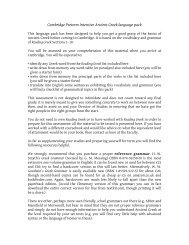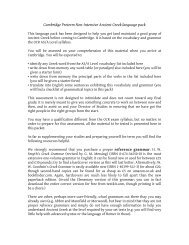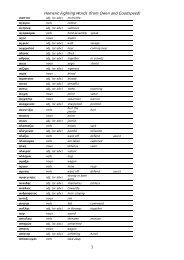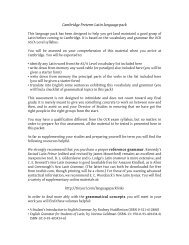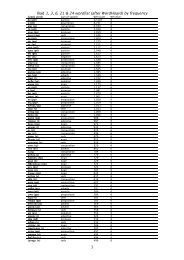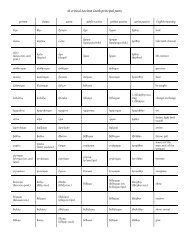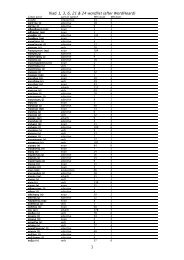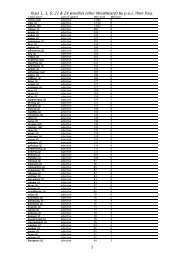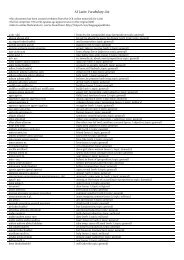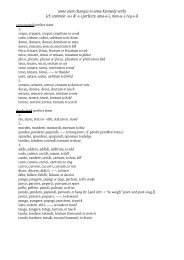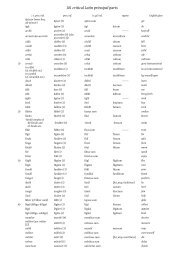Lexicon for Iliad 1, 3, 6, 21 & 24 (draft) 1 - CW's language page
Lexicon for Iliad 1, 3, 6, 21 & 24 (draft) 1 - CW's language page
Lexicon for Iliad 1, 3, 6, 21 & 24 (draft) 1 - CW's language page
You also want an ePaper? Increase the reach of your titles
YUMPU automatically turns print PDFs into web optimized ePapers that Google loves.
<strong>Lexicon</strong> <strong>for</strong> <strong>Iliad</strong> 1, 3, 6, <strong>21</strong> & <strong>24</strong> (<strong>draft</strong>)<br />
επαυρεω (For the Root, v. a)paura/w.) • Act. to partake of, share, c. gen. rei, Il. • of physical contact, to touch, graze, c. acc., esp. of<br />
slight wounds, Il.; also c. gen. to touch, Il. • Mid. to reap the fruits of a thing, whether good or bad: • c. gen., in good<br />
sense, Il., Eur. • in bad sense, i(/na pa/ntes e)pau/rwntai basilh=os that all may enjoy their king, i. e. feel what it is to have<br />
such a king, Il.; c. acc. et gen., toiau=t' e)phu/rw tou= filanqrw/pou tro/pou such profit didst thou gain from . . , Aesch.;<br />
and absol., min e)paurh/sesqai o)i/+w I doubt not he will feel the consequences, Il.<br />
ε e)\ e)/, or e)\ e)\ e)\ e)/, an exclamation, woe! woe! Aesch., etc.<br />
ε se, v. subou(=, sui.<br />
επειγω Mid. and Pass., fut.e)pei/comai • to press down, weigh down, Il. • to press in pursuit, to press hard, press upon, absol.<br />
and c. acc., Hom. • to drive on, urge <strong>for</strong>ward, e)retma\ xersi e)/peigon Od.; of a fair wind, Od., Soph. • to urge on, hurry<br />
on a thing, Od., Soph.: —Pass., of a ship, Il.:—Mid. to urge on <strong>for</strong> oneself, to e)mo ga/mon Od.;th paraskeuh/n Thuc.:—<br />
absol., e)peigome/nwn a)ne/mwn by the <strong>for</strong>ce of winds, Il.;o)po\s ga/la e)peigo/menos sune/phcen the fig-juice by its <strong>for</strong>ce<br />
curdled the milk, Il. • Pass. to hurry oneself, haste to do, c. inf., Il.:—absol. to hasten, hurry, speed, make haste, Il., etc.:<br />
part., e)peigo/menos in eager haste, eagerly, Il.; c. inf., du=nai e)peigo/menos eager <strong>for</strong> its setting, Od.; c. gen.,<br />
e)peigo/meno/s per o(doi=o longing <strong>for</strong> the journey, Od. • intr. in Act., = Pass. to hasten to a place, Soph., Eur.:— ta\<br />
e)pei/gonta necessary matters, Plut.<br />
επειµι (ei)mi\ sum) • inf.-ei)=nai • fut.-e/somai • epic-essomai • to be upon, c. dat., Il., Aesch.; but in Prose with prep., e)pi\ tou=<br />
katastrw/matos Hdt.;e)pi\ tai=s oi)ki/ais Xen. • to be set upon, Hdt.:—of rewards and penalties, to be affixed or attached,<br />
Aesch., etc. • of Time, to be hereafter, remain, Od.; e)pesso/menoi a)/nqrwpoi generations to come, Orac. ap. Hdt.:—also<br />
to be at hand, Soph., Xen. • praeesse, tisi Hdt. • to be added, be over and above, of numbers, Hdt.<br />
επειµι (ei)=mi ibo) • inf.-ie/nai • (serving in Attic as fut. ofe)pe/rxomai) • epic 3rd sg. imperf.e)ph/i+en • pl.e)ph/i+san • e)ph=|san<br />
• Attice)ph/|ein • 3rd pl.e)ph/|esan • fut.e)piei/somai • part. fem. aor1 mid.e)pieisame/nh • to come upon: • come near,<br />
approach, Od. • mostly in hostile sense, to come or go against, attack, assault, c. acc., Il.; c. dat., Il., Hdt., Attic; absol.,<br />
Hom.;oi( e)pio/ntes the invaders, assailants, Hdt.; buto( e)piw/n = o( tuxw/n, the first comer, Soph. • to get on<br />
thebh=ma to speak, Thuc.: to come on the stage, Xen. • of events, etc., to come upon one, overtake, c. acc., Il., Aesch.: c.<br />
dat. to come near, threaten, Il., etc. • c. dat. pers. to come into one's head, occur to one, Plat., Xen.;—absol., tou)pio/n<br />
what occurs to one, Plat. • of Time, to come on or after: mostly in part.e)piw/n, ou=sa, o/n, following, succeeding,<br />
instant, h( e)piou=sa h(me/ra the coming day, Hdt.;o( e)piw bi/otos Eur.;ta\ e)pio/nta the consequences, Dem.;o( e)piw/n<br />
the successor, Soph. • to go over a space, to traverse, visit, c. acc., Od., Hdt., etc. • to go over, i. e. count over, Od.<br />
επει quum: • OF TIME, after that, after (postquam), since, when (quum), with aor. to express a complete action, or imperf. to<br />
express one not yet complete, e)pei\ u(phnti/azen h( fa/lagc kai\ h( sa/lpigc e)fqe/gcato after the phalanx began to advance<br />
and the trumpet had sounded, Xen. • = e)c ou(=, from the time when, ever since, e)pei/te pare/labon to qro/non since I<br />
came to the throne, Hdt. • with Subjunct., a)/n orke being added, so thate)pei/ becomese)pa/n, e)ph/n, ionice)pea/n, ore)pei/<br />
ke: — referring to future time, e)ph e(/lwmen when we shall have taken the city, Il.:—also whenever, e)pei/ ke<br />
li/ph| o)ste/a qumo/s Od. • with Opt. withouta)/n, referring to future time, e)peidh\ pro\s to\ fw=s e)/lqoi after he had come<br />
into the light, Plat.:—also whenever, e)pei\ pu/qoito Xen. • in oratione obl. after past tenses, representing a subj. in orat.<br />
rect., e)pei\ diabai/hs, the direct <strong>for</strong>m beinge)ph diabw=, Xen. • quum primum, Xen.;e)pei\ eu)qe/ws Xen.;e)peidh\ ta/xista<br />
Plat.;e)peidh\ qa=tton Dem. • CAUSAL, since, seeing that, with Ind. or Opt. witha)/n, Hom., etc.; with Imp., e)pei\<br />
di/dacon <strong>for</strong> teach me, Soph.;e)pei\ pw=s a) kale/seias; <strong>for</strong> how would you call him? Ar.:—sometimes it may be rendered<br />
by although, or by else, otherwise. • quandoquidem, since indeed, Hdt.;e)pei/per seeing that, Aesch., etc.;e)pei/ toi since<br />
surely, Soph.<br />
επειτα (


